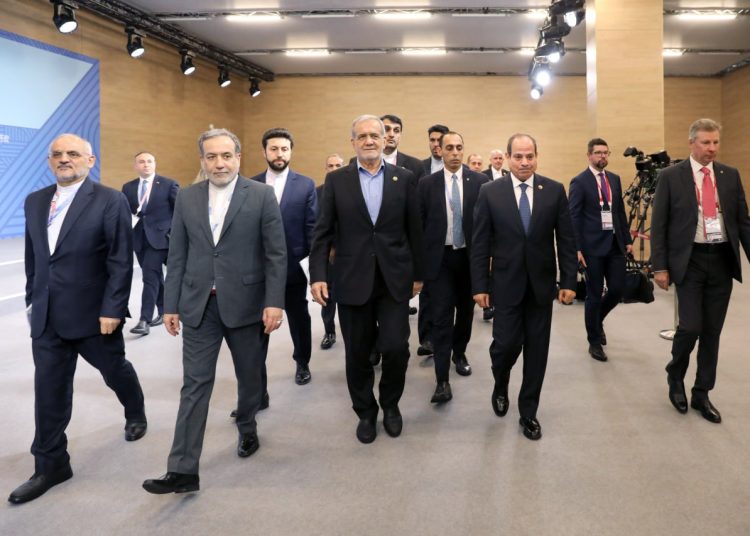The relations between Iran and Egypt have historically been complex, shaped by a myriad of geopolitical, cultural, and historical factors. Recent developments indicate a renewed interest in enhancing bilateral ties, marked by significant diplomatic engagements and cooperative ventures.
Diplomatic Engagements
A pivotal moment in Iran, Egypt relations occurred during the BRICS summit in Kazan, Russia, where Iranian President Masoud Pezeshkian and Egyptian President Abdel Fattah El-Sisi convened for discussions. This meeting symbolized a significant step towards fostering diplomatic relations, emphasizing the need for regional stability and bilateral cooperation. The dialogue aimed to address pressing mutual concerns, including security, economic collaboration, and the ongoing crises in the region.
Furthermore, the recent visit of Iran’s Foreign Minister, Abbas Araghchi, to Cairo underscored an active approach in diplomatic engagements. During his visit, Araghchi held discussions with his Egyptian counterpart and President El-Sisi, further reflecting the desire for sustained dialogue. These high-level exchanges are crucial in building trust and understanding between the two countries, laying the groundwork for more substantial cooperation in various domains.
Regional Tensions
Iran and Egypt’s discussions have prominently featured regional tensions, particularly concerning the humanitarian crises in Gaza and Lebanon as a result of Israeli aggressions. Both nations share a deep concern regarding the implications of these crises on regional stability and the humanitarian conditions faced by affected populations. Their collaborative dialogue reflects a shared interest in promoting peace and alleviating human suffering.
Given Egypt’s pivotal role in Middle Eastern affairs, particularly in relation to the Palestinian issue, its involvement is critical. Egypt has historically been a mediator in Arab-Israeli conflicts. This partnership with Iran could amplify their voices on regional platforms, promoting a united front aimed at achieving a ceasefire and long-term stability.
Restoration of Diplomatic Ties
Efforts to restore full diplomatic relations between Iran and Egypt are gaining momentum. This initiative aligns with a broader regional trend towards reconciliation, which has been catalyzed by a recent thaw in relations between Iran and Saudi Arabia. Both Tehran and Cairo are recognizing the benefits of re-establishing formal diplomatic channels that have remained largely dormant since the late 1970s.
The potential restoration of diplomatic ties may facilitate cooperation in various sectors, including counter-terrorism, trade, and cultural exchange.
Economic Cooperation
The exploration of economic cooperation is another crucial aspect of Iran, Egypt relations. Both nations are keen to identify opportunities in energy and trade, sectors where each can offer complementary advantages. Iran’s strategic location as a transit hub for international transport corridors presents an opportunity for Egypt, which is looking to diversify its trade routes and enhance its economic resilience.
The potential for collaboration extends to energy, particularly in light of the shifting global energy landscape. Iran possesses vast energy resources, while Egypt has been making strides in developing its own natural gas sector. Joint ventures in energy production and infrastructure development could lead to increased trade, thereby facilitating the transfer of energy and commercial goods. However, the Western sanctions could be an impediment for the economic cooperation.
The Role of BRICS
The recent accession of both Iran and Egypt to the BRICS heralds new possibilities for enhanced cooperation. This platform offers a unique opportunity for diplomatic engagement through regular meetings and summits that can facilitate dialogue on longstanding issues. By leveraging the collective strength of BRICS, Iran and Egypt can negotiate better trade deals and attract investments, thereby diversifying their economic relations beyond traditional Western markets.
Moreover, BRICS can serve as a catalyst for cultural and educational exchanges, fostering mutual understanding. This people-to-people interaction is essential in building lasting ties between the two nations.
Furthermore, the platform can assist in collaborative efforts toward regional stability and security. Coordinated actions to combat terrorism and address ongoing conflicts can emerge from BRICS discussions, aligning with both countries’ interests in promoting peace in the Middle East.
Lastly, BRICS provides a framework for technological and scientific collaboration. Joint research initiatives and technology transfer agreements can stimulate advancements across various sectors, including healthcare, agriculture, and renewable energy, further strengthening bilateral relations.
Conclusion
The relationship between Iran and Egypt is undergoing a transformation marked by renewed diplomatic engagement, and a shared commitment to addressing regional challenges. As both nations navigate the complexities of their historical interactions, the framework provided by BRICS offers new avenues for cooperation and dialogue. In an era where regional stability is increasingly precarious, the potential for Iran and Egypt to work together could prove beneficial not only for their bilateral relations but also for the Middle Eastern geopolitical landscape.






